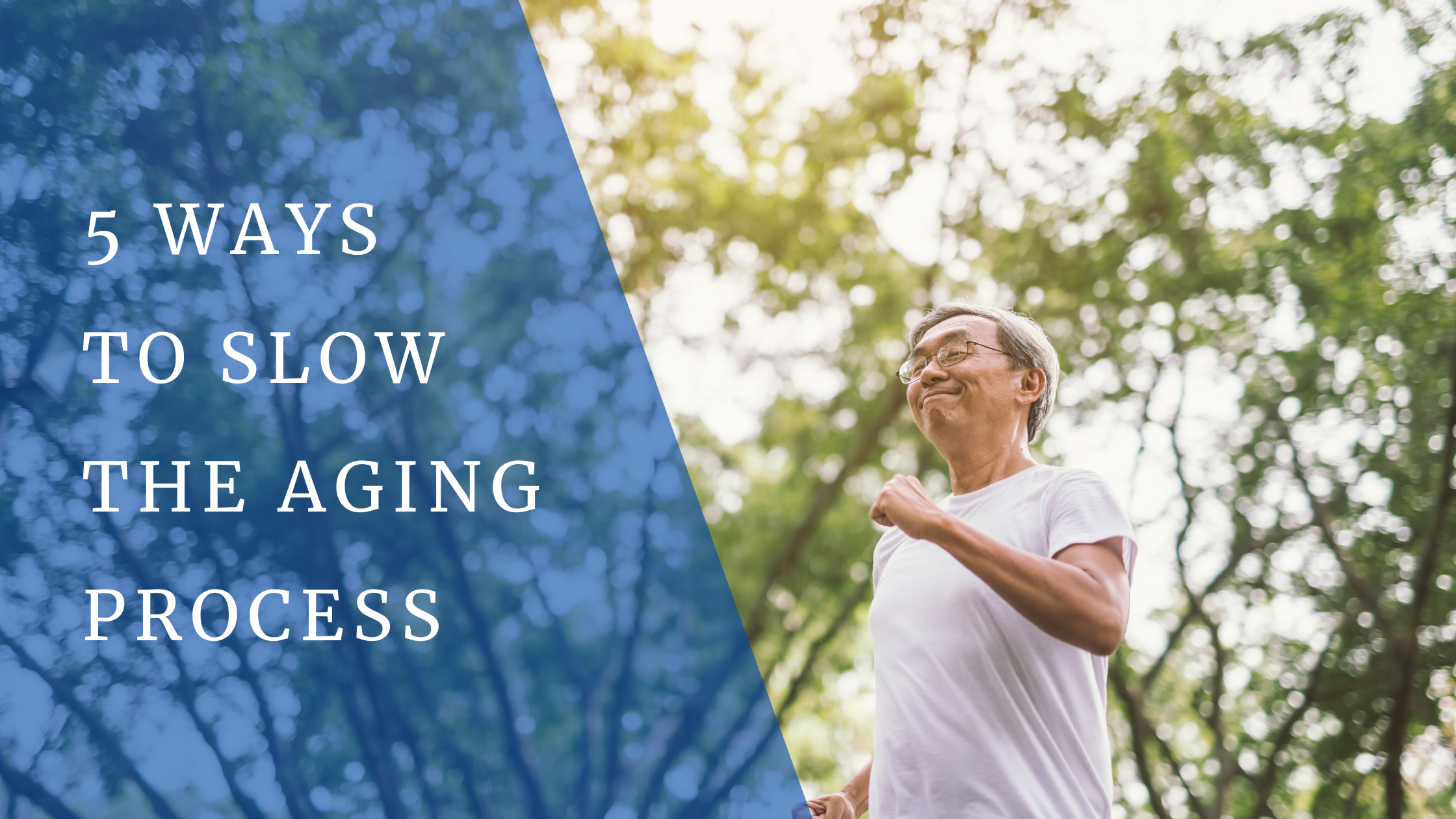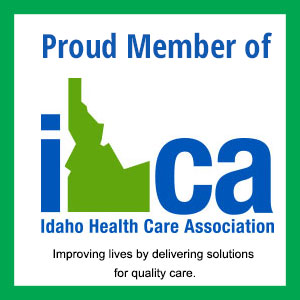
People are consistently looking for the fountain of youth and ways to slow the aging process. Why is it that some people seem to never age, while others age quickly? Is it genetics? It is a magical potion? Is it certain foods? Is it a specific lifestyle? Here we will explore five ways to slow the aging process for seniors and to take things into your own hands.
Hydrate
Drinking water is one of the best things that we can do to help our bodies. Water is essential and has many benefits for our overall well-being Some of these benefits include¹:
- Dehydration prevention¹
- Aids in maintaining a healthy weight¹
- Protects your spinal cord and vital organs¹
- Helps the body keep a normal temperature¹
- Assists with healthy bowel movements¹
- Rids the body of waste¹
- Increases energy levels²
- Enhances cognitive function²
- May prevent headaches²
You may be wondering, “How much water should I be drinking each day?” In general, seniors should aim to drink approximately 1.7 liters per day, which is roughly 57 ounces.³
Lower Your Stress
One of the fastest ways to add years to one’s life is to avoid living in a state of constant, heightened stress. Stress has been linked to conditions such as high blood pressure, obesity, diabetes, headaches, fatigue, stomach and sleep problems, decreased immune system, and more.⁴ Implementing ways to combat stress will do wonders for one’s overall well-being Some techniques you can try to lower stress are:
- Relax and practice mindfulness
- Go outside and enjoy the fresh air
- Exercise
- Talk to a good friend or family member
- Get a massage
- Work on a fun project
- Start a gratitude journal
Trying several of these techniques all at once can seem overwhelming. Simply starting with one can help tremendously and give some relie. The goal is to decrease stress levels, even if it is only a little, as this will help add vitality and health back to one’s life.
Choose Healthy Food Options
The food that we put into our bodies is the fuel that keeps us going. Not all fuel is equal and in fact, the type of food that we consume can have a significant impact on one’s health and aging process. While there are many diets out there claiming to be the end-all-be-all, here are some guidelines on what a balanced, healthy diet looks like and how to incorporate it into your life.
- Eat vegetables, fruits, and whole grains.⁵
- Minimize the amount of processed foods that are ingested.⁵
- Cut back on foods that are high in sugar and high fructose corn syrup.⁵
- Incorporate lean meats into your diet such as fish and poultry.⁵
- Limit foods that are high in saturated fat.⁵
- Be conscientious of portion sizes and try not to overeat.⁵
- Cut down on sodium.⁵
- Find healthy food options that you enjoy eating that can be substituted for unhealthy choices.
- Have a friend or family member join you on your health journey and share tips with each other that are helpful to continue eating in a healthy manner.
- Establish daily, weekly, and monthly goals that help you stay on track.
Changing eating habits is one of the most difficult things a person can do, especially when they have been eating a particular way for a long time. However, as you incorporate healthy options into your diet and meet dietary goals, you’ll start to feel the benefits mentally and physically of what a healthy diet can do to add more pep into your step.
Move Every Day
We have all heard it before, “exercise keeps us young and healthy.” Movement has so many health benefits and helps fight the aging process in several ways. There are mental, physical, social, and emotional advantages. Seniors who move and exercise on a consistent basis will gain the following benefits:
- Enhanced strength⁶
- Improved balance⁶
- Increased energy⁶
- Prevention or delay of multiple diseases such as osteoporosis, heart disease, and diabetes⁶
- Maintain a healthy weight⁶
- Mental clarity and improved cognition⁶
- Socialization⁶
- Decreased depression and anxiety⁶
- Enhanced mood⁶
- Decreased risk of falls⁶
The proper amount of movement for seniors is usually 30 minutes per day, 5 days a week. However, this may be a big jump for some. A relatively inactive person will benefit from even just a small amount of movement. It’s so important to just start. A person can begin with 10 minutes a day and work on adding more movement from there.⁷ The important thing to remember is to get some form of movement in every single day.
Get Adequate Sleep
Sleep is one of the most essential components to maintaining health and slowing the aging process. Seniors that suffer from sleep deprivation are at a higher risk for diabetes, hypertension, obesity, mental fog, depression, stroke, fatigue, inability to concentrate, mood changes, irritability, and more.⁸ There are several things that a person can do to improve their sleeping patterns and gain a healthy amount of sleep. These include:
- Exercise on a regular basis⁹
- Avoid drinks that contain caffeine before bed⁹
- Do not watch TV or be on an electronic device while lying in bed⁹
- Go to bed at the same time each day⁹
- Avoid going to bed stressed
- Make sure your sleeping environment is comfortable and inviting
In general, seniors are advised to gain 7-8 hours of good-quality sleep per night. A person can keep track of the amount of sleep they are getting over a couple of weeks. This will allow them to see if they are achieving the optimal amount of sleep. If they are not, trying some of the above suggestions could help. There are also sleep experts and health professionals readily available that can assist in this effort.
Bringing It All Together
We have just covered five vital areas that can help you feel more energized, and healthy, and combat the aging process. This information can seem overwhelming and one might not know where to start. The key is to take one or two things from these suggestions and incorporate them into your daily routine. Once those have become a habit, others can be added. So start slowing the aging process today!
References
- CDC. (2002). Benefits of drinking water. Retrieved from https://www.cdc.gov/healthyweight/healthy_eating/water-and-healthier-drinks.html#:~:text=Water%20helps%20your%20body%3A,%2C%20perspiration%2C%20and%20bowel%20movements.
- Healthline. (2020). 7 Science-Based Health Benefits of Drinking Enough Water. Retrieved from https://www.healthline.com/nutrition/7-health-benefits-of-water
- Better Health While Aging. (2022). Q&A: How to Prevent, Detect, & Treat Dehydration in Aging Adults. Retrieved from https://betterhealthwhileaging.net/qa-how-to-prevent-diagnose-treat-dehydration-aging-adults/#:~:text=Experts%20generally%20recommend%20that%20older,fluid%20ounces%2C%20or%207.1%20cups.
- Mayo Clinic. (2021). Stress management. Retrieved from https://www.mayoclinic.org/healthy-lifestyle/stress-management/in-depth/stress-symptoms/art-20050987#:~:text=Indeed%2C%20stress%20symptoms%20can%20affect,heart%20disease%2C%20obesity%20and%20diabetes.
- NIH, (n.d.). Healthy eating plan. Retrieved from https://www.nhlbi.nih.gov/health/educational/lose_wt/eat/calories.htm
- CDC. (1999). Older Adults. Retrieved from https://www.cdc.gov/nccdphp/sgr/olderad.htm
- CDC. (2022). How much physical activity do older adults need? Retrieved from https://www.cdc.gov/physicalactivity/basics/older_adults/index.htm#:~:text=Adults%20aged%2065%20and%20older,of%20activities%20that%20strengthen%20muscles.
- NCBI. (2006). Extent and Health Consequences of Chronic Sleep Loss and Sleep Disorders. Retrieved from https://www.ncbi.nlm.nih.gov/books/NBK19961/#:~:text=The%20cumulative%20long%2Dterm%20effects,%2C%20heart%20attack%2C%20and%20stroke.
- CDC. (2022). Tips for better sleep. Retrieved from https://www.cdc.gov/sleep/about_sleep/sleep_hygiene.html
Let Us Help You Today!
We welcome the opportunity to speak with you about The Cottages and the care that our residents receive at our Idaho locations. We are experts in assisted living and memory care and have been serving seniors for over 20 years. Our small home-like senior living homes and specially-trained team members offer an atmosphere that promotes the well-being of your loved one.
If you have any questions, would like to tour one of the Idaho assisted living or memory care homes, or receive a no-pressure consultation with one of our licensed administrators, please fill out the form below. Please mention which location(s) you’re interested in.



